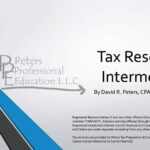Answering clients’ tax questions accurately and on time is a key challenge for tax practitioners. Through simple, plain language explanations and examples, this course will help practitioners perform tax research more efficiently by describing the structure of the primary sources, highlighting the difference between primary and secondary sources and describing the steps in the tax research process. Discussion Leader: David Peters
Roth IRA Funding Options (LITX04/26)
There are multiple options for funding a Roth IRA. Each option is subject to a strict set of rules, and breaking any of these rules could negate the tax benefits of the Roth IRA. When done right, these funding options can help to create tax-free income for a Roth IRA owner and their beneficiaries. During this presentation, Denise will demonstrate how to operate within the regulatory limitations for funding Roth IRAs, thus avoiding excise taxes and penalties that apply to overfunding. Discussion Leader: Denise Appleby
Tax Research Fundamentals (LITX03/26)
The sheer number of sources of tax law can be overwhelming when you are first starting off as a practitioner. How do you differentiate between each one? What does each of them do? And what happens when there are conflicts between them? Through simple, plain language explanations and examples, this course gives the new practitioner an introduction to tax law. It talks about the types of primary authority and how they interact with each other. Discussion Leader: David Peters
Keeping Up with the Tax Code (LITX02/26)
Whether you are an experienced veteran or new to the industry, one of the toughest parts of being a tax practitioner is keeping up with all of the changes in tax legislation. The Keeping Up the Code series takes a look at recent changes to tax law from a practitioner perspective. We don’t just hurl code sections at you without explanation. Using examples, problems, and plain explanations, we explore a mix of new tax issues and areas of the code that tend to be misunderstood in a practical and straight-forward way. In this session, we will explore Required Minimum Distribution rules, as well as changes that have been made in light of SECURE 1, SECURE 2, and other recent IRS pronouncements. Discussion Leader: David Peters
Lifecycle Financial Planning – Qualified Business Income Deduction (LITX01/26)
Even though it has been around several years, many practitioners fail to take full advantage of the QBI deduction due to its complexity and many nuances. In this course, we will discuss how to maximize the QBI deduction. We will get into the details of what QBI includes (and doesn’t include), which entity structures work best for the QBI deduction, and what to do if we have negative QBI. While the QBI deduction is only one deduction on the tax return, for small business owners, it may be the largest and most important deduction that they can take! Discussion Leader: David Peters
Tax Credit Benefits for C-Corporations (LIMG04/25)
This course is tailored to C-Corporation entities who want to learn more about offsetting their Federal and SC state tax liabilities. The instructor will provide an overview of the tax credit process and potential savings for investors. Discussion Leader: Matt Zackon
Expanded Enforcement (LIMG03/25)
With the IRS ramping up enforcement efforts under the Inflation Reduction Act, tax professionals are seeing a surge in IRS correspondence. This course provides a deep dive into the IRS’s expanding use of technology, data analytics, and automated compliance measures. Learn how to navigate these changes, respond effectively to IRS notices, and implement proactive compliance strategies to better serve your clients. Discussion Leader: Hayley Bales
Tax Planning Using South Carolina Textile Mill, Abandon Building, Historic, and LIHTC Tax Credits (LIMG02/25)
This presentation explores the South Carolina Property Rehabilitation and Housing Tax Credits programs and its benefits for property owners, developers, South Carolina taxpayers, and the community. Specifically, it will cover the SC Historic Rehabilitation Tax Credit, SC Abandoned Building Tax Credit, and SC Abandoned Mill Tax Credit as well as complimentary tax and community programs specific to property rehabilitation. Discussion Leader: Geoff Cover
Tax Planning Based on Form 1040- Part One (LITX21/25)
Part 1 of 2: The many changes made to the Internal Revenue Code have created numerous unique planning opportunities for individuals. Careful tax planners must weigh current rules with an eye toward the future. This course will assist the practitioner in charting alternatives and guiding clients through these complex tax times. Planning is a year-round process, and this course is loaded with ideas that can be used throughout the year to reduce taxes. Among the ideas discussed will be the Alternative Minimum Tax, charitable giving, tax-saving strategies for real estate owners and investors, and much more. Working systematically through Form 1040, the practitioner will be given many ideas on how to reduce taxes through planning. Discussion Leader: Art Werner










